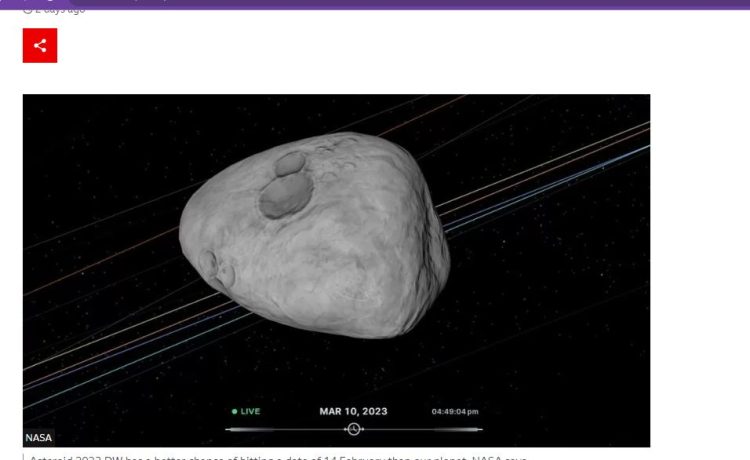A newly detected asteroid has a very small chance of impacting the Earth in 2046, Nasa tweeted on Tuesday.
If it does hit, the asteroid, roughly the size of an Olympic swimming pool, may arrive on Valentine’s Day 2046 according to Nasa calculations.
The closest the asteroid is expected to get to Earth is about 1.1 million miles (1.8m km), Nasa says.
But researchers are still collecting data, which they say may change predictions.
The asteroid, dubbed 2023 DW, has about a 1 in 560 chance of hitting Earth, according to Nasa. It’s the only space rock on Nasa’s risk list that ranks a 1 on the Torino Impact Hazard Scale.
The scale, which goes from 0-10, measures the risk of space objects colliding with Earth. All other objects on the scale rank 0, indicating no risk for impact.
A ranking of 1 means that an actual collision is extremely unlikely and no cause for public concern, Nasa’s Jet Propulsion Laboratory (JPL) says.
“This object is not particularly concerning,” JPL navigation engineer Davide Farnocchia told CNN.
If it does collide with us, 2023 DW would not have the same doomsday effect as the asteroid that decimated the Earth’s dinosaurs 66 million years ago. That asteroid was far bigger at 7.5 miles (12km) wide, Scientific American says.
But an impact from 2023 DW could still cause significant damage if it were to land atop a major city or densely populated area. A meteor less than half the size of 2023 DW exploded over Chelyabinsk, Russia, 10 years ago, causing a shock wave that blew out windows across 200 square miles and injured roughly 1,500 people.
While contact with an asteroid seems unlikely, scientists have been preparing for such an encounter for years. Last October, Nasa confirmed the agency’s Double Asteroid Redirection Test (Dart) mission had successfully changed the travel path of a small asteroid by slamming a spacecraft into it.
“That’s the very reason why we flew that mission,” Mr Farnocchia said, “and that mission was a spectacular success.” BBC







